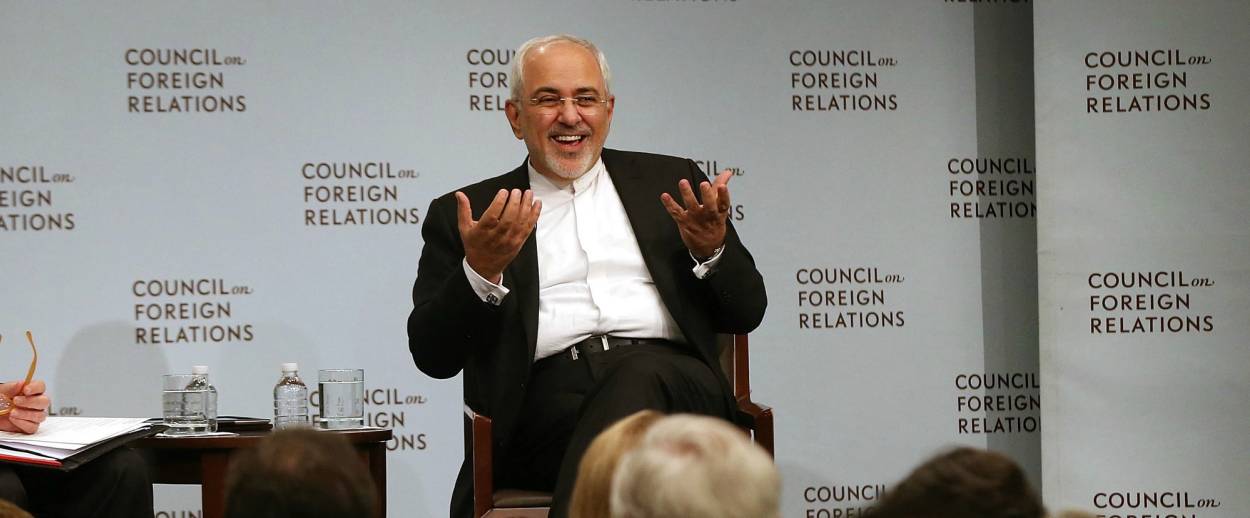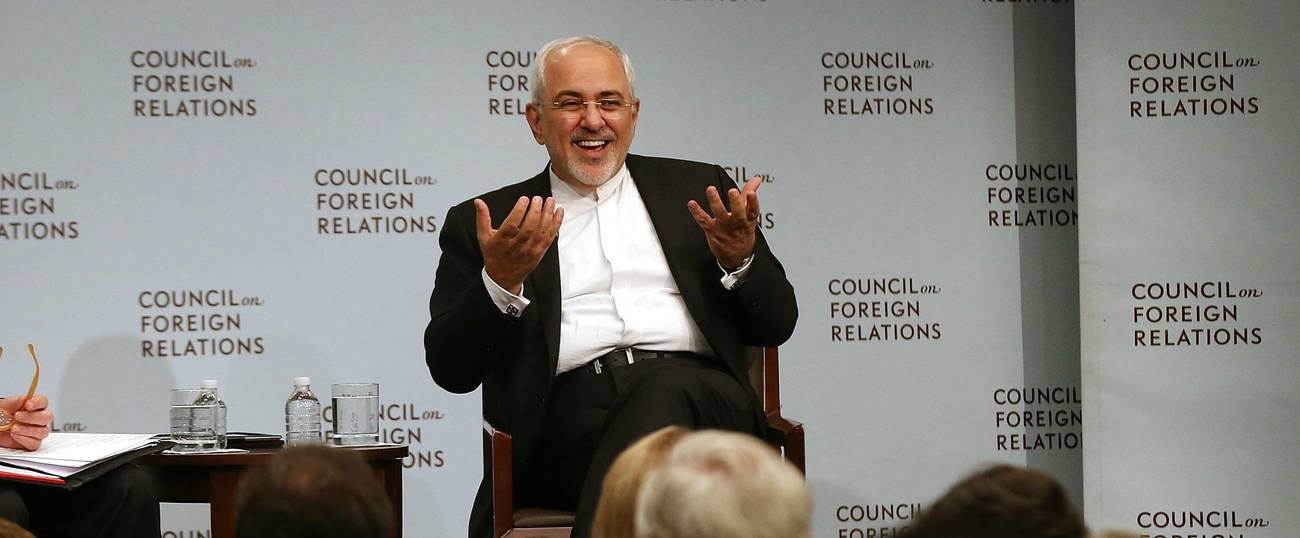Javad Zarif’s Charm Offensive
In person and in print, Iran’s foreign minister does his best to wash away the crimes of the regime he represents




For most of his adult life, Iranian foreign minister Javad Zarif has been an agent of a regime that tortures political prisoners, bans entire religions, and recruits children for foreign wars. Little surprise that he isn’t a terribly sophisticated moral thinker. “The millions of Syrian refugees fleeing their homes are not fleeing a man, a sect, or a government,” Zarif wrote in an over 2,800-word essay published in The Atlantic yesterday. “They are fleeing war and terror.” It’s odd for a top diplomat to discuss “war” and “terror” as if they’re somehow detached from the actions of rulers, sects, or governments—what use are foreign ministers if wars are no more subject to human control than earthquakes or hurricanes? Of course that’s not quite what he means. A sentence earlier, Zarif alleges that “terror groups” in Syria “have at some point been directly or indirectly funded and armed by some of our neighbors, and in some cases by the United States itself.” In Zarif’s view, war and terror are instruments of policy, while kings are merely history’s slaves. A quick control+F neatly bridges this incoherency: The name Bashar al-Assad appears zero times in the entire essay.
Refusing to name Assad betrays unusual self-awareness on the part of Zarif or his ghostwriters. Zarif has done little and perhaps even nothing to improve the state of the human race, and as the chief diplomat of Assad’s key regional ally the ledger is arguably stacked quite a ways against him. Perhaps the writing team realized how absurd or even sinister the rest of the piece would seem if readers were in any way reminded of the starvings, gassings and tortures that Assad has committed with Iranian military assistance, financial backing, and diplomatic cover. Certainly the siege of Aleppo gives a line like “Our desire—in principle and practice—is that all the nations of the region enjoy security, peace, and stability” a much different valence.
For someone with his resume, Zarif enjoys remarkable prestige in the US. It could be that he’s seen as a leading defender of an Obama legacy item, given the Trump administration’s disavowal of the Iran Deal. Maybe the explanation is simpler: Zarif speaks English beautifully, and writes in sophisticated-sounding bromides. He is a credulous listener’s idea of a foreign policy whiz.
The full Zarif experience was on dazzling display during a talk he gave at the Asia Society on September 27th, where he managed to be firm but nimble, demonstrating an actor’s sense of timing and delivery. The absurdities—or, less generously, the lies—were frequent. “We derive our power and our legitimacy from the people, unlike your allies in the region,” the Foreign Minister of a country whose own “allies in the region” include the Assad regime and whose government earned a robust “not free” rating from Freedom House said. “We do not derive our legitimacy from the beautiful military equipment we get from the US.” The line landed: Half the auditorium burst into applause after that particular zinger.
Under pressure from the moderator, a sometimes-assertive Charlie Rose, Zarif said “we have no proof” that the Assad regime, which owes its survival to Iranian military intervention, ever used chemical weapons. “We are in Syria not to support anyone but to fight ISIS,” Zarif said—never mind that ISIS didn’t really exist as a separate entity from Al Qaeda, a group Iran has often assisted, until February of 2014, several years into Tehran’s efforts to rescue Assad. “Our region needs the message of dialogue,” he said, neglecting to mention that over 500 Iranian troops have been killed dialoguing in Syria. Zarif repeatedly tried to argue that the US backed the Taliban government in Afghanistan in the 1990s. “We never supported the Unocal deal,” Zarif said, an apparent reference to a conspiracy theory that the US secretly propped the Taliban in order to secure the construction of a natural gas pipeline. (The real story, while sordid enough, is far different).
These statements are predictable coming from an Iranian official, but they’re interesting from a psychological perspective. Like Zarif’s agnosticism on whether the Holocaust actually happened, the cringier parts of his Asia Society talk hint at where his heart may actually lie—He is not just a defender of his regime’s policies, but a proudly transparent believer in its larger mission and meaning. Zarif has been widely viewed as an interlocutor between longstanding enemies, and has presented himself as such since the early 2000s. But he’s also spent decades working for the Islamic Republic regime, and he has an uncanny ability to deflect even the appearance of conflict within his supposed dual persona. The antitheses of advancing world peace and advancing the interests of the Tehran regime are repackaged as brilliant synthesis. For some, this performance is indistinguishable from actual charm, erasing any and all suspicions of what might be going on in Evin Prison at a given moment. Some are helpless to resist him, and commit public debasements at his feet. “We’re friends, you have to understand,” Charlie Rose said by way of backing down from a tense exchange over Iran’s role in Syria. “It doesn’t look that way, but it’s true!,” Zarif beamed, happy for this inexplicable off-ramp.
Zarif takes full advantage of this obsequious treatment, which gives him the space he needs to carry out the hard work of advancing Tehran’s policies. During the Asia Society talk, he implied that Iran might think twice about ratifying the Additional Protocol of the Non-Proliferation Treaty depending on what actions Congress takes during the next six years, a statement that subtly puts one of the JCPOA’s biggest accomplishments back into play. He twice referred to the JCPOA as “a UN resolution.” In the US, the deal has the legal status of an “executive agreement” between the US president and the deal’s various other parties, but in for Zarif, the “Iran deal” isn’t the Joint Comprehensive Plan of Action announced in Geneva on July 14th, 2015, but the July 20th UN Security Council vote endorsing the Geneva deal and terminating a raft of UNSC resolutions on the country’s nuclear program. One wonders how many JCPOA supporters understand the deal in these terms. Still, Zarif believes he can get away with a lot, and so far, he’s been proven right: “Iran will…continue on its own path of dialogue, mutual respect, and understanding,” he wrote at the close of his Atlantic piece.
Armin Rosen is a staff writer for Tablet Magazine.